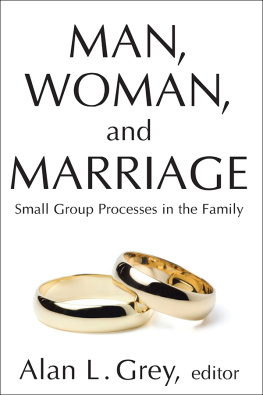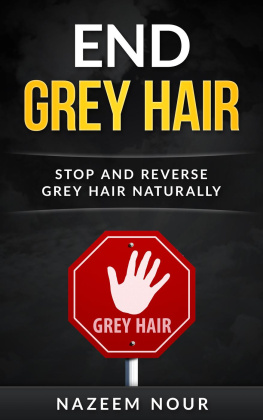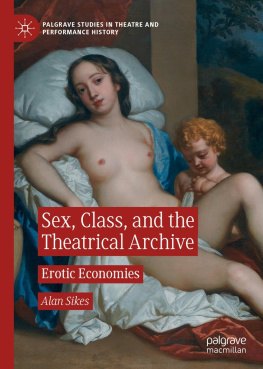First published 1969 by Transaction Publishers
Published 2017 by Routledge
2 Park Square, Milton Park, Abingdon, Oxon OX14 4RN
711 Third Avenue, New York, NY 10017, USA
Routledge is an imprint of the Taylor & Francis Group, an informa business
Copyright 1969 by Taylor & Francis.
All rights reserved. No part of this book may be reprinted or reproduced or utilised in any form or by any electronic, mechanical, or other means, now known or hereafter invented, including photocopying and recording, or in any information storage or retrieval system, without permission in writing from the publishers.
Notice:
Product or corporate names may be trademarks or registered trademarks, and are used only for identification and explanation without intent to infringe.
Library of Congress Catalog Number: 2009013771
Library of Congress Cataloging-in-Publication Data
Grey, Alan L., 1919
Class and personality in society / Alan L. Grey.
p. cm.
Includes bibliographical references and index.
ISBN 978-0-202-36259-5 (alk. paper)
1. Personality and culture. 2. Social classes. 3. Socialization. I. Title.
BF698.9.C8G7 2009
155.92dc22
2009013771
ISBN 13: 978-0-202-36259-5 (pbk)
The Editor
ALAN L. GREY is on the faculty of the Clinical Psychology Program of the Graduate School of Arts and Sciences, Fordham University, where he also has served as a research consultant to the Social Research Institute. He received his B.A. from the City College of the City University of New York, his M.A. from Columbia University, and his Ph.D. from the University of Chicago. He is on the staff of the William Alanson White Institute of Psychoanalysis as a research coordinator and as supervisor of psychotherapy in the Blue Collar Treatment Program of the Low Cost Clinic. Since 1965 he has been a Field Selection Officer for the Peace Corps. In addition to his teaching and research, Dr. Grey is a practicing psychoanalyst and psychotherapist. He has published articles in professional journals and has contributed to several books.
Consulting Editors
ELY CHINOY
Smith College
SOCIOLOGY
ELIOT FREIDSON
New York University
MEDICAL SOCIOLOGY
ROBERT S. HIRSCHFIELD
Hunter College
POLITICAL SCIENCE
ARNOLD S. KAUFMAN
University of Michigan
PHILOSOPHY
JEROME L. SINGER
City College, CUNY
PSYCHOLOGY
DAVID SPITZ
Ohio State University
POLITICAL THEORY
NICHOLAS WAHL
Princeton University
COMPARATIVE POLITICS
FREDERICK E. WARBURTON
Barnard College
BIOLOGY
Alan L. Grey
Class differences, once hidden safely at the back of the American ideological closet, have finally clattered into the political arena to demand recognition. The civil rights movement, Headstart programs, the war on poverty, riot-control legislation, all are separate operations directed toward the same culturally deprived people of our nation. As official adoption of that term suggests, the problem is not only financial. Nor is it simply a matter of skin color: hard-core poor whites are involved as well as nonwhites in a multiplicity of legislative plans concerned with so wide a range of ills that plainly the central task is conceived as no less than the revision of total life circumstances for a significant segment of our society.
Whether or not we like the term class, these limited bits of information about those who are the objects of concern suggest that they do constitute a social classor classesas defined by the sociologist:
Social classes may be defined as aggregates of individuals often without specific inherent differentiating characteristics, who enter into and maintain relations with one another on a basis of equality, in contrast to other members of the community from whom they are distinguished (for the moment at least) by socially recognized standards of inferiority and superiority. Members of a given class characteristically develop a similar mode of life and similar attitudes and patterns of behavior and, with varying degrees of explicitness, a sense of belonging together (Alpert, 1964, pp. 56-57).
To the extent that human personality is learned, to the extent that characterological variations are responses to varying life experiences, it becomes plausible to suspect that status differences, and the diversity of circumstances they imply, may also be associated with predictable personality differences. The notion is, of course, not a new one. Aristotle, for instance, put himself on record in behalf of the characterological superiority of the middle classes (Aristotle, in Bendix and Lipset, 1953, pp. 17-18), while the New Testament is well known for its bias in favor of the virtues of the poor. Any literate person can add readily to the list of famous men who made observations about how mans worldly lot may influence his disposition: Machiavelli, Rousseau, Darwin, Marx, Freud, Webernot to mention a long roster of novelists and other philosophers and scientistsall stated views that have been absorbed into the common opinion that those of the upper classes behave one way and those of the lower classes another (see, for example, Hodges, 1964; Sorokin, 1928). It is to the orderly exploration of this proposition that our attention is directed.
Research in class character covers a range of phenomena that stand at a crossroad between psychology, sociology, psychiatry, anthropology, their sundry subdisciplines, and their intellectual neighbors. A book of this length cannot mirror the full range and depth of thinking on the subject; the plan is, rather, to present some key issues of substance and method via a sampling of articles previously published in the journals of several social sciences. A prime intention in selection was to afford the reader a firsthand experience in examining the divergent ways in which various specialists have viewed and explored the relationship between personality and social status. Hopefully, perusal will offer a sense of how, out of disagreements and confusions, great clarity and sophistication may sometimes emerge. Before turning to the specific papers, a brief review will put the issues into their historical context. An accompanying bibliography allows for further pursuit of facets which may prove interesting.
Modern Beginnings: Personality Undifferentiated from Culture
In contemporary history there are at least three related social-science specialties concerned with the interplay between environment and individual characteristics : personality-and-culture, national-character, and class-character research. Since all are involved in the quest for a conceptual system to adequately explain the interaction between social circumstances and individual response patterns, any development in social theory, in personality formulations, or in research methods useful in any one of these fields has usually found its way into the others. Thus, a sound perspective on class-character research calls for some consideration of all three areas and, in fact, of the broader fields from which they have emerged.














